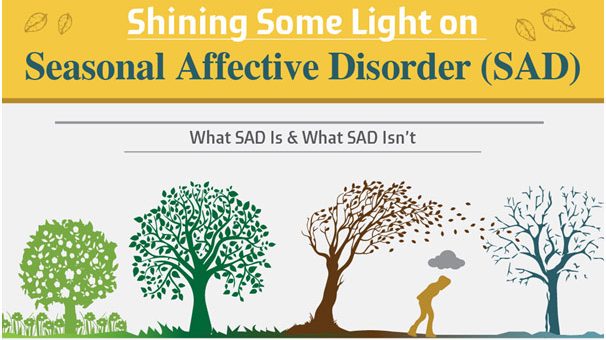According to the HSE website (http://www.hse.ie/eng/health/az/S/Seasonal-affective-disorder/) 7% of us on this lovely emerald isle suffer from what is known as Seasonal Affective Disorder, or as it is so aptly abbreviated SAD. As a lover of the sunshine I know I am most certainly part of this 7%.
What happens that so many of us feel like going into hibernation like our furry friends after the clocks go back and the evenings get darker? SAD is a mood disorder that is brought about by a change in the level of sunlight we are exposed to. As you might agree we are often happier in the summertime, this is because all that sun exposure increases serotonin, otherwise known as our happy hormone. What you might not know is that the more darkness we are exposed to increases our melatonin, our sleep hormone, making us more fatigued.
The HSE list the symptoms of SAD as;
- Low mood
- Loss of interest in ordinary things
- Being less active
- Sleeping more
- Putting on weight
Things to prevent and reduce SAD symptoms.
Top tips
- Exercise – exercising increases your serotonin levels helping to combat the affect of those dark evenings.
- Get outdoors when it is bright and make the most of those lovely dry crisp days
- Keep your home and office space Bright and Airy
- Take your sunshine vitamin – Vitamin D3 – we make vitamin D3 by absorbing the sunlight through our skin. In a systematic review ‘Vitamin D deficiency and depression in adults’ published in the British Medical Journal (2013) that included 31,424 participants vitamin D deficiency was shown to be associated with depression.
- Take high EPA and DHA concentration Omega 3 – A review published in the American Journal of Psychiatry (2006) on omega 3 fatty acids and mood disorders concluded that low levels of omega 3 was a contributing factor to mood disorders as well as omega 3 supplementation having a therapeutic affect for people with mood disorders.
- Talk to someone about how you’re feeling, you’re not alone.
Anglin, R., Samaan, Z., Walter, S. And McDonald, S. (2013) ‘Vitamin D deficiency and depression in adults: systematic review and meta-analysis’ (The British Journal of Psychiatry) Vol 202, pp 100 – 107 doi: 10.1192/bjp.bp.111.106666
Health Service Executive (2016) ‘Seasonal Affective Disorder’ Available at : http://www.hse.ie/eng/health/az/S/Seasonal-affective-disorder/ (Accessed on: 08//11/2016)
Parker, G., Gibson, N., Brotchie, H., Heruc, G., Rees, A-M. And Hadzi-Pavlovic, D. (2006) ‘Omega-3 Fatty Acids and Mood Disorders’ (American Journal of Psychiatry) Vol (163) pp 969–978



